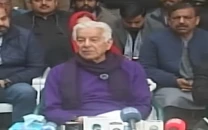The PPP’s economic poverty

The PPP’s economic poverty
And yet the party has suffered from economic poverty of an unusual kind. Despite its edge over other parties in its concern for real economic issues, it is strange but true that the PPP never had in its fold a person rising from its own membership to assume the stewardship of the economy. Zulfikar Ali Bhutto had Feroze Kaiser, a chartered accountant, and Shahid Husain from the World Bank. Benazir appointed V A Jafri, a veteran bureaucrat who had served in the finance ministry, and Shahid Hasan Khan. In the present set-up, there has been Shaukat Tareen, the banker, and now friend Abdul Hafeez Shaikh. Of course there was Dr Mubashir Hasan but he was not allowed to continue. Makhdoom Shahabuddin was not expected to be active except on the day of the budget. And Naveed Qamar’s two stints were briefer than a sonnet.
The job of the finance minister is not to conceive good policies. These are well-known and require only a reasonable education and understanding, not an economics doctorate from Harvard or Cambridge. In any case, experts can be employed for specific tasks. What is trickier is the art of developing political consensus around good economic policies within the party and across the floor in both houses of parliament. There is also the selling job to do outside the parliament. This is the forte of those who come from the political mill and rise and fall with their parties. Those who appear on the scene at the opportune time with an impatient reformist zeal end up taking one step forward, two steps back, no matter how impeccable their professional credentials. Tareen fits this bill. A banker, who quickly acquainted himself with the economic reform agenda, wanted everything done yesterday. He left, which was easier than the effort required to take the party along. He cannot even claim a role in the consensus on the National Finance Commission Award, which was the handiwork of the Punjab chief minister. Hailed by the press as a man of integrity resigning on a matter of principle, the fact of the matter is that he was overwhelmed by the quantum of reform required, and demoralized by the opposition he faced in the cabinet.
Why has PPP not been able to throw up a politician finance minister has something to do with its reaction to the charge of populism. While its thoroughbread tread the populist path merrily, it hires an expert preferably of the Bretton Woods variety to do a paint job. In the process, it ends up annoying the people as well as the international financial community. No wonder, the two highest years of inflation are associated with PPP Mark I and IV. Sadly, there has been no learning. Can Hafeez Shaikh alleviate the PPP’s economic poverty? Upright as a person and credible as an economist, he has seen political manoeuvring in the provincial and federal cabinets.
However, politics lorded over by a military dictator is chickenfeed compared to politics under politicians. The PPP’s peculiar culture has its own demands. Entry into the senate as well as a formal membership of the party will help. But to make his mark, he needs a commitment to continue until the next elections and give in return his own commitment to be in the PPP, in and out of power.



















COMMENTS
Comments are moderated and generally will be posted if they are on-topic and not abusive.
For more information, please see our Comments FAQ